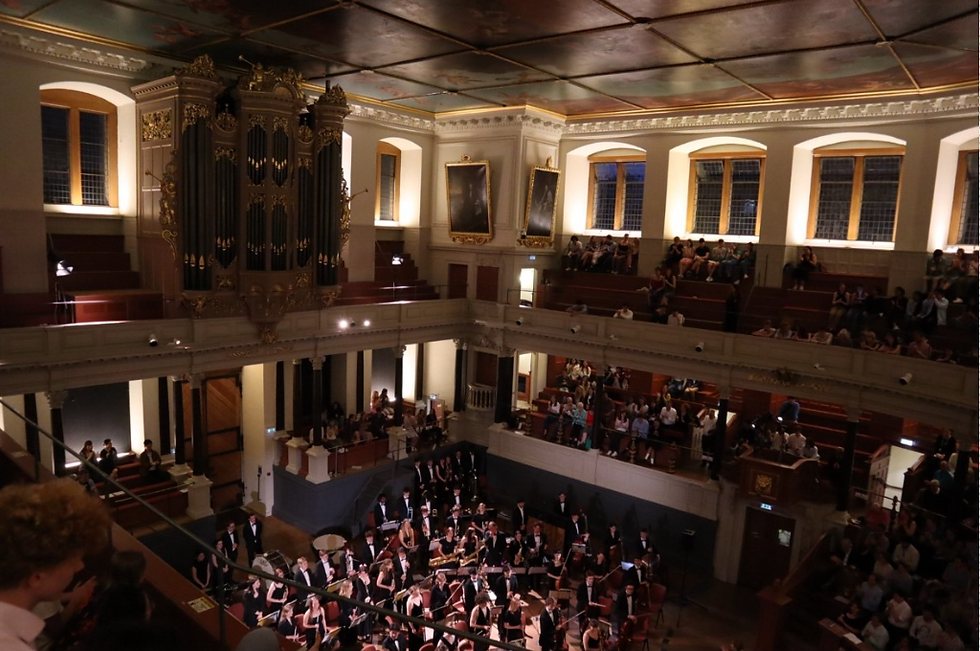Review: Oxford University Wind Orchestra – HT19
- Evie Brenkley

- Mar 13, 2019
- 3 min read
by Lucia Švecová

On the 2nd of March, OUWO once again impressed the audience with a great range of works for a wind ensemble from all around the world, as indicated by the title of the concert. Though the works were significantly challenging for the players, the overall performance effect achieved the goal of widening the concert repertory for which OUWO events are always especially valued. The thorough programme notes, as well as the introduction from conductor Christopher O’Leary, made us familiar with the diverse collection of pieces and drew our attention to the significance of the context in which the works were composed – something which I believe is pivotal for audiences that are used to mostly western canonical repertoire.
The concert started off with Malcolm Arnold’s Tam o’Shanter Overture, fully drawing the audience into the magic of the music to be performed that night. OUWO’s impressive percussion section deserves special recognition for successfully creating the atmosphere of the shock of witnessing ‘a wild orgy of witches and warlocks’. Nevertheless, the orchestra as a whole demonstrated mastery of contemporary repertoire, and so this was a great start to the definitely magical concert.
The second piece in the programme was Aaron Copland’s Emblems, which was a debut for Rose Campion as the assistant conductor in Hilary term. Her word of introduction to the piece was a great contribution to the audience’s understanding of it and the performance itself demonstrated the impressive work she has done with the orchestra only over the course of one term. Copland’s rhythmic challenges, however, proved to be an obstacle for a truly fluent performance. Nevertheless, Rose succeeded in overcoming the small inconsistencies and the especially lyrical delivery of the ‘Amazing Grace’ tune contributed to the overall effective performance.
The Concerto for Alto Saxophone and Band by Paul Creston introduced new talents among the students, which was greatly appreciated since University ensembles typically call on professional soloists rather than promoting the talents from among their own ranks. Katie Bunney, a first year music student from St Catherine’s, proved her impressive musicianship in her solo, as well as in following O’Leary’s lead in cooperating with the orchestra. Undoubtedly, her familiarity with the orchestra as one of its members facilitated the interplay between the saxophone solo and the orchestra. The audience was clearly taken aback by the immense talent that Bunney demonstrated. The orchestra itself successfully played the important role in re-creating the sound world of the 1920s.
Returning to the magic evoked by the first piece, Guy Woolfenden’s Illyrian Dances presented us with a magic of ‘Never Never Land’ that, according to the composer, Illyria was to Shakespeare, as the programme tells us. In contrast to the Arnold, it was the lyricism of the music that we enjoyed as opposed to new combinations of timbre and strong percussion, which was a pleasing contrast in the second half of the concert. The final Gigue might have achieved a bit more dance-like character in a slightly brisker tempo, but the impression was achieved gradually over the course of the section. Nevertheless, the overall experience of the magic of the whole work left the audience quite enchanted.
Finally, Serge Lancen’s Symphonie Ibérique represented a grandiose end to the concert. The landscape structure of introducing different regions was achieved by the different types of dances represented, and the orchestra succeeded in creating a distinctive yet unified feeling in the individual movements of the symphony. Thanks to the startling energy of O’Leary’s conducting, both he and the orchestra transferred an impulse to dance to the audience, and so this piece definitely made us excited for the next OUWO concert!
OUWO stands as the fore-runner of introducing new repertoire among the main University orchestras, which is a particularly important position in the context of rather conservative Oxford audiences. With Christopher O’Leary about to start his second term as conductor, we can look forward to see what direction he takes the orchestra.








Comments